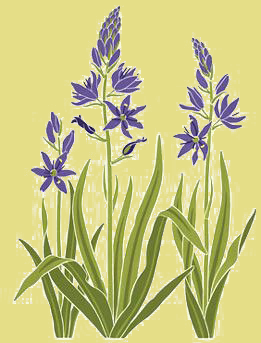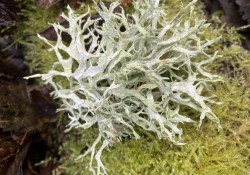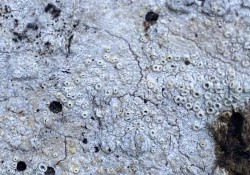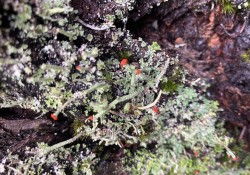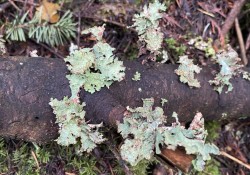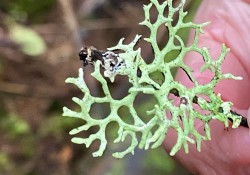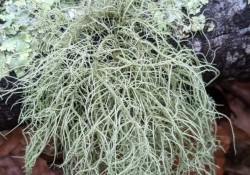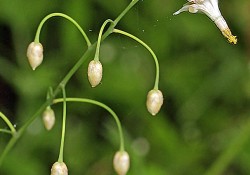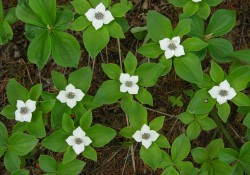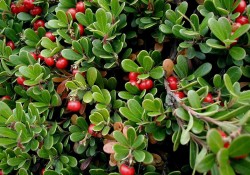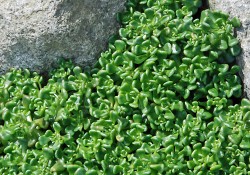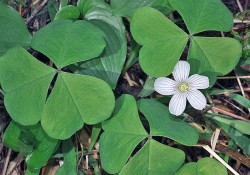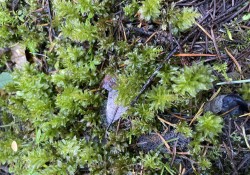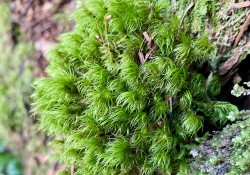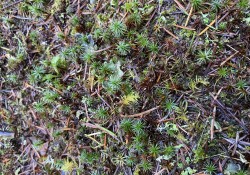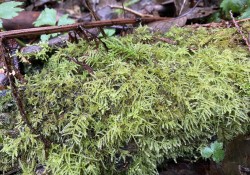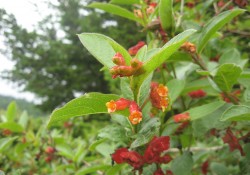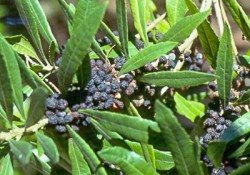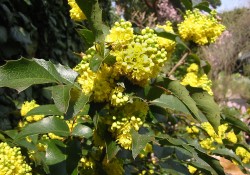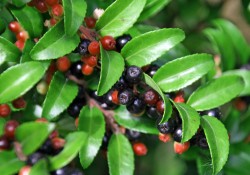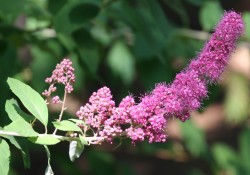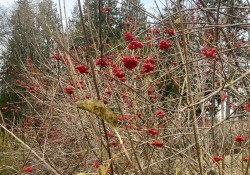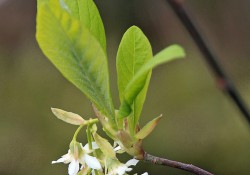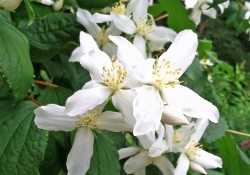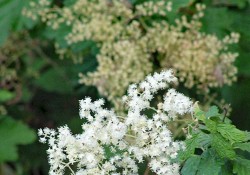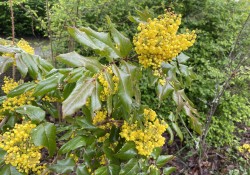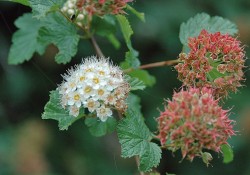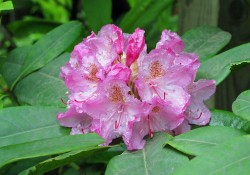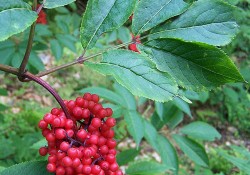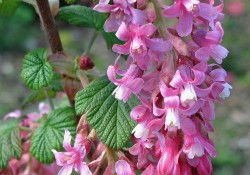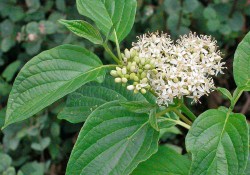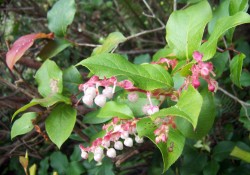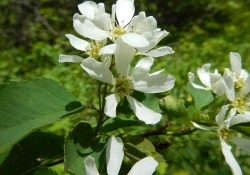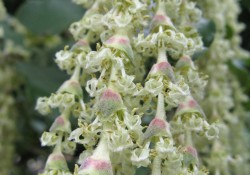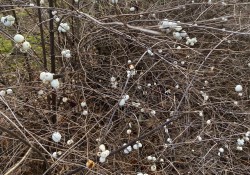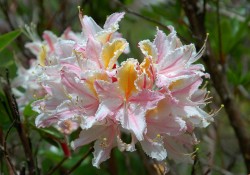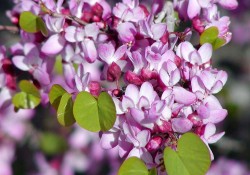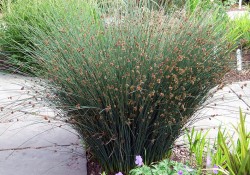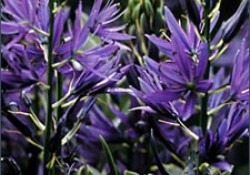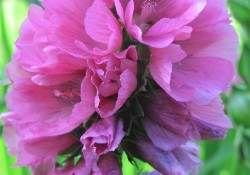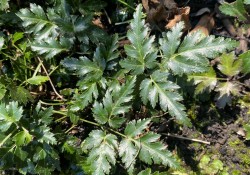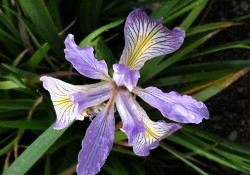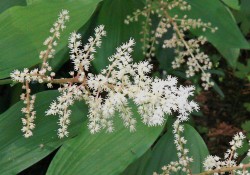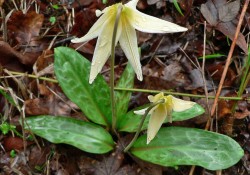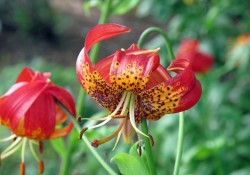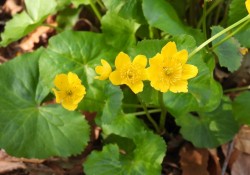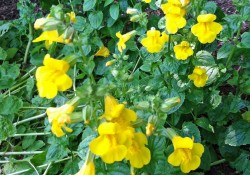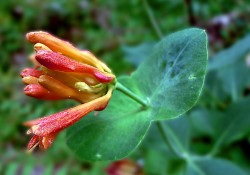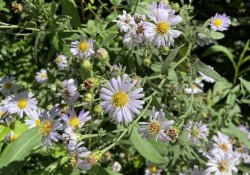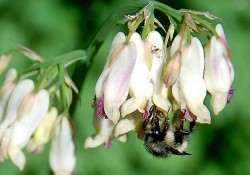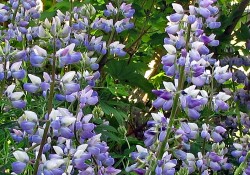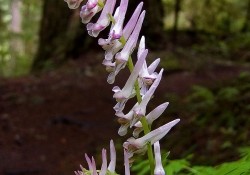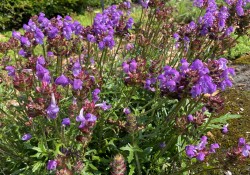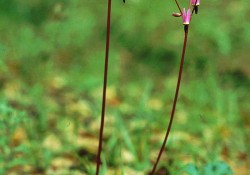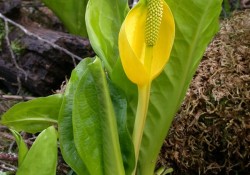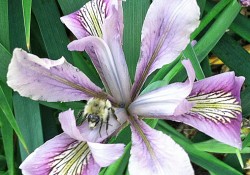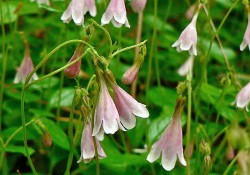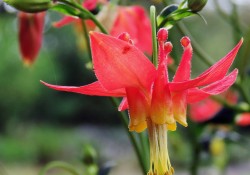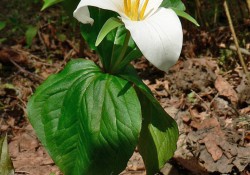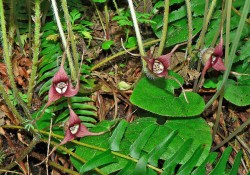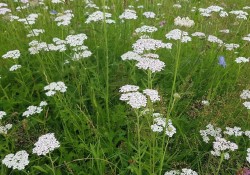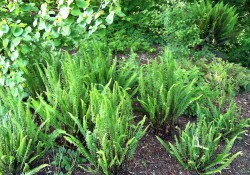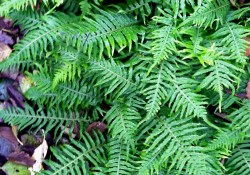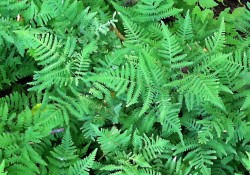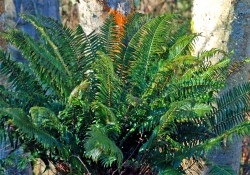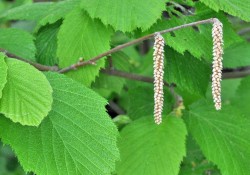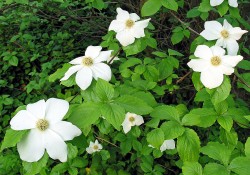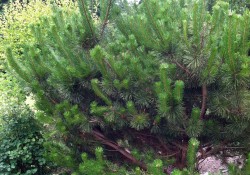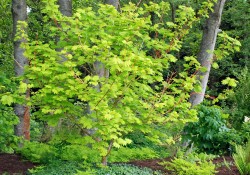'Antlered perfume' lichen, or oakmoss, is one of the most common lichens in our area.
Plant Profiles
Read a little about some of our favorite native plants suitable for home gardens. These perennials, ferns, grasses, shrubs, and trees are all native to coastal Washington, Oregon, Northern California, and British Columbia, west of the Cascade Mountains.
New categories for mosses and lichens have items not intentionally curated in the garden, but which are fascinating and constitute an essential part of the ecosystem.
Lichens
Crustose lichens are crust-like lichens that grow tightly attached to a their substrate which can be bark, rock, soil, fences, roof shingles....
This 'lipstick Cladonia' is the most common of the red-fruited Cladonias.
Platismatia glauca is a common and widespread species of foliose (leafy) lichen. Whitish-grey, it becomes greenish when wet. The underside is typically black.
Hypogymnia is a genus commonly known as tube lichens, bone lichens, or pillow lichens. They generally grow on the bark and wood of conifers, and they have hollow (tube-like) lobes.
Usnea grows abundantly on trees at the north end of the Native Plant Garden; in the wild it's widely found on conifers and hardwoods.
Groundcovers
Vancouveria hexandra, commonly known as American barrenwort, is an attractive, easy-care groundcover. Its leaves form a mat 6 to 8 inches tall.
Mitella breweri, a small woodland plant in the Saxifragaceae family, makes a beautiful perennial ground cover.
Cornus Canadensis, more commonly know as bunchberry, is a delicate jewel for a shady, damp area of the garden.
One of the Northwest's most attractive and well-known all-season ground covers, Arctostaphyllos uva-ursi grows in a variety of settings.
A beautiful groundcover and rock garden plant, Sedum oreganum has tight rosettes of shiny, succulent, green leaves, reminiscent of a tiny jade plant.
Pacific waterleaf, Hydrophyllum tenuipes, is a deciduous perennial native to British Columbia and as far south as Northern California.
In the wild, Oxalis oregana, redwood sorrel, is found in moist Douglas fir and Coastal redwood forests in the Cascade, Olympic and Coast Mountains, from Southern British Columbia to...
Achlys triphylla, commonly called vanilla leaf. is found from British Columbia to Northern California. It prefers moist shaded sites in forest openings and along streambeds.
Mosses
Badge moss (or Coastal leafy moss) grows on rotten logs, tree bases, and soil and humus in moist, shaded coniferous forests. The shoots are relatively tall--from 1" to 3" high.
Dicranum scoparium, the broom forkmoss, is a species native to most of the northern hemisphere.
This beautiful moss grows in every continent including Antarctica. Each plant consists of an upright stem with leaves that are rigid and sharply pointed like evergreen needles.
Oregon beaked moss, Kindbergia oregana, grows in lowland NW forests, forming loose mats on trees, stumps, rocks, and humus--it's one of the most common mosses in our area.
Shrubs
Black twinberry (Lonicera involucrata) produces pairs of small yellow tubular flowers, which turn burgundy red in late summer; the flowers mature to black berries.
Myrica californica, commonly known as California or Pacific wax myrtle, is native to most of the California, Oregon and Washington coasts and as far north as Vancouver Island.
Mahonia nervosa is commonly called Cascade Oregon grape. It is an evergreen suckering shrub, growing slowly to about 2 feet tall and wide.
Vaccinium ovatum, with its small glossy dark green leaves and new shoots tinged with bronze, is a tough, but well behaved, addition to the native garden.
Spirea douglasii is commonly known as hardhack or Douglas spirea. It is a deciduous shrub 4 - 6 feet tall, often forming large thickets.
American highbush cranberry (not a true cranberry) can grow to over ten feet, has a three-lobed leaf with serrated edges, and produces colorful red berries.
Oemleria cerasiformis, commonly called Indian plum or osoberry, is a large deciduous shrub, growing to 12'-18' tall and 10'-14' wide.
The native mock orange, Philadelphus lewisii, blooms in mid to late June in the Buck Lake Native Plant Garden.
Holodiscus discolor, commonly called oceanspray, because of its frothy pendants of white flowers, is a deciduous shrub found in the wild from southern British Columbia into California.
As you enter the Buck Lake Native Plant Garden from the north entrance and walk the main path, you will see the shiny holly-like leaves of tall Oregon grape, Mahonia aquifolium.
Pacific ninebark, Physocarpus capitatus, deserves a place in any garden. It sports glossy maple-like leaves and showy puffs of white flowers in the spring.
The Pacific Rhododendron is Washington's state flower. It grows from southern British Columbia to northern California, west of the Cascades and it can reach to about 20 feet in height.
A tree-like shrub, Sambucas racemosa, commonly known as red elderberry, is native to much of the U.S. and Canada, where it grows in open forests, along streambanks and in moist clearings...
At the south entrance to the Buck Lake Native Plant Garden, the path is flanked on both sides by cultivars of beautiful Ribes sanguineum.
Native dogwoods come in three basic forms: shrubs (Cornus sericea), the ground cover bunchberry (Cornus canadensis), and the dogwood tree.
Gaultheria shallon, also known as salal, is one of the most common understory plants found in forests from Alaska to Northern California.
Amelanchier alnifolia, commonly known as serviceberry, offers multi-season interest and is worthy of a place in every garden.
The beautiful shrub commonly known as silk tassel bush, Garrya elliptica, is found in the coast range from southern Oregon to the middle of California.
Snowberry, or Symphoicarpus albus, is a deciduous shrub that grows up to 6' tall and can colonize an area to form a dense thicket.
Western azalea, Rhododendron occidentale, is native to Southern Oregon and Northern California, west of the Cascades, occupying a variety of habitats from streambeds to coastal bluffs.
Abundant in the foothills along the northern California coast and in small patches in southern Oregon,Cercis orbiculata, or Western redbud, puts on a stunning display in spring, when its...
Grasses
Juncus patens,California gray rush, is an adaptable reed that is native to the entire west coast of the U.S.
Perennials
In the wild, Camassia leichtlinii, commonly known as great camas, is found in damp mountain meadows and grasslands.
Sidalcea hendersonii, Henderson's checkermallow, sometimes called marsh hollyhock or checkerbloom, blooms in early summer with 1'-5' tall spikes of pink flowers.
Coptis aspleniifolia, or fernleaf goldthread, is a low-growing plant that flourishes in undisturbed forests, providing groundcover and also food for deer.
One of 11 species of native iris collectively known as Pacific Coast iris, Douglas iris, Iris douglasiana, is native to the Oregon and California coasts.
For a shady woodland site, there is no better plant than false Solomon's seal, Maianthemum racemosum.
Erythronium is a genus of spring-flowering perennials, several species of which are native to the area from Northern California to British Columbia.
A star in any garden, Lilium paradalium, commonly called leopard lily, blooms in summer with gorgeous crimson blossoms 3"-4" inches across on stems 5'-7' tall.
Marsh marigold, a yellow-flowering plant about 18" high, grows in marshes and the edges of lakes and in moist woodland.
Yellow monkeyflower, mimulus guttatus, is a colorful addition to damp areas of the garden.
Orange trumpet honeysuckle, Lonicera ciliosa, is a garden-worthy native vine, found in thickets and along creek and river banks from British Columbia to Northern California.
Pacific aster grows 1 - 4 feet tall, and will feed bees and other pollinators late into the summer. Its flowers have white to pink or violet petals and a yellow center.
Pacific bleeding heart, Dicentra formosa, looks delicate with is pendulant, heart-shaped flowers and fern-like foliage, but looks are deceiving.
Riverside lupine (also known as streambank lupine), Lupinus rivularis, is common throughout Northern California, Oregon and Washington, west of the mountains.
Another beautiful Pacific Northwest wildflower, Corydalis scouleri can be grown in the home garden in a shady spot.
Self-heal 'Magdalena' has a purple flower that's pleasingly larger than the variety found on many northwest lawns. It blooms in May-June and may do so again later in summer.
As the saying goes, "Good things come to those who wait." It will take some patience to introduce Dodecatheon hendersonii, commonly called Henderson's shooting star, to your garden.
Western skunk cabbage, one of the Northwest's most wonderfully primitive-looking plants, grows in swampy, wet forest areas. It produces a pungent odor, hence its name.
One of 11 species in the group collectively called Pacific Coast iris, Iris tenex, or tough-leaf iris, will be the jewel of your garden during its May bloom.
A fragile-looking but adaptable little plant, Linnaea borealis or twinflower, is found across the Northern U.S., and through California and the Rocky Mountains (actually throughout much...
Although a common perennial, Aquilegia formosa, Western columbine, is nevertheless a beautiful addition to any garden.
Trillium ovatum, Western trillium, needs dappled shade and a moist, but well-drained, humus-rich soil to thrive.
Asarum caudatum, or Western wild ginger, is a pretty understory plant that thrives in moist locales on forest floors at low and middle elevations, especially beneath Douglas fir, whose...
Yarrow (with other colorful names including Bloodwort, Carpenter's Weed, Milfoil, Devil's Nettle, Nosebleed Plant, Old Man's Pepper, Soldier's Woundwort, and Thousand-leaf) is a native herbaceous...
Ferns
Blechnum spicant, or deer fern as it is commonly known, prefers shady moist conditions and humus-rich soil.
Licorice fern, Polypodium glycyrrhiza, is a beautiful and unusual plant. This fern is epiphytic, so needs a moist atmosphere, where it can extract nutrients from the air.
Gymnocarpium dryopteris, more readily known as oak fern, adds a punch of apple-green to shady areas of the garden.
The ubiquitous Western sword fern, Polystichum munitum is a garden work horse.
Trees
This deciduous, often multi-trunked, tree grows between 10 to 15 feet in height and a similar width.
Our native Pacific dogwood, Cornus nuttallii. is a graceful open-branched tree.
The Buck Lake Native Plant Garden has planted a hedge of shore pines as a backdrop to the large swale on one side and shrubs and perennials on another.
In the wild, Acer circinatum, commonly know as vine maple, is found as an understory plant to taller trees, such as alder and Douglas fir.
